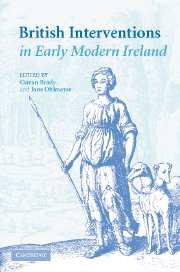Book contents
- Frontmatter
- Contents
- Notes on contributors
- Acknowledgements
- Aidan Clarke: an appreciation
- Conventions
- List of abbreviations
- 1 Making good: New perspectives on the English in early modern Ireland
- 2 The attainder of Shane O'Neill, Sir Henry Sidney and the problems of Tudor state-building in Ireland
- 3 Dynamics of regional development: processes of assimilation and division in the marchland of south-east Ulster in late medieval and early modern Ireland
- 4 The ‘common good’ and the university in an age of confessional conflict
- 5 The construction of argument: Henry Fitzsimon, John Rider and religious controversy in Dublin, 1599–1614
- 6 The Bible and the bawn: an Ulster planter inventorised
- 7 ‘That Bugbear Arminianism’: Archbishop Laud and Trinity College, Dublin
- 8 The Irish peers, political power and parliament, 1640–1641
- 9 The Irish elections of 1640–1641
- 10 Catholic Confederates and the constitutional relationship between Ireland and England, 1641–1649
- 11 Protestant churchmen and the Confederate Wars
- 12 The crisis of the Spanish and the Stuart monarchies in the mid-seventeenth century: local problems or global problems?
- 13 Settlement, transplantation and expulsion: a comparative study of the placement of peoples
- 14 Interests in Ireland: the ‘fanatic zeal and irregular ambition’ of Richard Lawrence
- 15 Temple's fate: reading The Irish Rebellion in late seventeenth-century Ireland
- 16 Conquest versus consent as the basis of the English title to Ireland in William Molyneux's Case of Ireland … Stated (1698)
- Principal publications of Aidan Clarke
- Index
5 - The construction of argument: Henry Fitzsimon, John Rider and religious controversy in Dublin, 1599–1614
Published online by Cambridge University Press: 31 July 2009
- Frontmatter
- Contents
- Notes on contributors
- Acknowledgements
- Aidan Clarke: an appreciation
- Conventions
- List of abbreviations
- 1 Making good: New perspectives on the English in early modern Ireland
- 2 The attainder of Shane O'Neill, Sir Henry Sidney and the problems of Tudor state-building in Ireland
- 3 Dynamics of regional development: processes of assimilation and division in the marchland of south-east Ulster in late medieval and early modern Ireland
- 4 The ‘common good’ and the university in an age of confessional conflict
- 5 The construction of argument: Henry Fitzsimon, John Rider and religious controversy in Dublin, 1599–1614
- 6 The Bible and the bawn: an Ulster planter inventorised
- 7 ‘That Bugbear Arminianism’: Archbishop Laud and Trinity College, Dublin
- 8 The Irish peers, political power and parliament, 1640–1641
- 9 The Irish elections of 1640–1641
- 10 Catholic Confederates and the constitutional relationship between Ireland and England, 1641–1649
- 11 Protestant churchmen and the Confederate Wars
- 12 The crisis of the Spanish and the Stuart monarchies in the mid-seventeenth century: local problems or global problems?
- 13 Settlement, transplantation and expulsion: a comparative study of the placement of peoples
- 14 Interests in Ireland: the ‘fanatic zeal and irregular ambition’ of Richard Lawrence
- 15 Temple's fate: reading The Irish Rebellion in late seventeenth-century Ireland
- 16 Conquest versus consent as the basis of the English title to Ireland in William Molyneux's Case of Ireland … Stated (1698)
- Principal publications of Aidan Clarke
- Index
Summary
Disputation and rhetoric were at the core of the Renaissance university curriculum. Formal training in, and fostering of, these skills was a major part of the education of the higher clergy. One consequence of the Reformation and the subsequent schism was that the emphasis of this training shifted from rhetoric to eristic. This development operated in a number of ways. At a political level, Cardinal William Allen and his associates at Douai aimed to replicate the collegiate world of Oxford as religious tests forced them and other recusants out of the English university system. Eristic literature therefore provided an initial manifesto for the alternative value-system of the exiles and their adherents. At a more popular level, this body of writing served to give coherent expression to the novel political, social and religious realities experienced by the laity. And as these realities shifted and developed over time, so too did the form and content of the texts themselves.
This chapter looks at a peculiarly Irish aspect of a major theme in controversial disputation and writing. While the action took place in Ireland and was shaped, to an extent, by very local concerns and conditions, the substantive core of the dispute was at the heart of prevailing theological dispute. All of the significant participants, Catholic and Protestant, shared a common formal education, and the form, content and choreography of the disputation reflects this bond.
- Type
- Chapter
- Information
- British Interventions in Early Modern Ireland , pp. 97 - 115Publisher: Cambridge University PressPrint publication year: 2005
- 1
- Cited by



